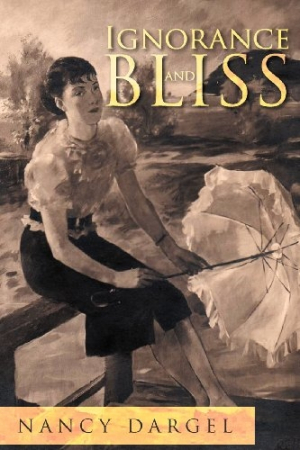Ignorance and Bliss
In writing her autobiography, Ignorance and Bliss, Nancy Dargel begins with, “She is reading herself a story.” In a literal sense, she’s talking about Peter Rabbit, but the sentence packs far more meaning than even Dargel likely intended.
Throughout her tale, which encompasses some of the most momentous events of the twentieth century, Dargel views her experience through a detached viewpoint, creating a fictionalized account of her life that often takes on a dreamy, fragmented tone. Although her biography suggests that all of the events she details are events she experienced, Dargel identifies her book’s heroine as Liz, and later as Lise, a transformation that occurs when she attempts to say her name in French when she arrives at a convent school in France.
Born in London just before World War I, Dargel was educated at the convent school, the Sorbonne, and Friedrich Wilhelm University. During World War II, she worked as an actress in Berlin, and later helped to rebuild that city while working in a diplomatic position. In her later years, she acted as an interpreter for the United Nations and UNESCO. She died in 2006, at the age of 94.
In detailing her life, Dargel’s use of Lise as a narrator provides a strong stream-of-consciousness style that proves compelling. She drifts occasionally from present tense to past tense and back again, in the same way that memories wash into everyday activities and distort time. Her writing, too, possesses a curious mix of crisp, straightforward description and more lyrical, dreamlike imagery that creates a feeling of being inside a memory, not just reading about one. Despite the book’s title, there’s no ignorance here, but there’s an abundance of bliss. For example, in writing about a trip to Ghana and noticing the sun behind a mist, Dargel notes: “She has seen the veiled disk, hanging very high up, the tropical sun one can look at without blinking; she has seen it again in effigy, in church, after Sunday Vespers, for the blessing of the Holy Sacrament.”
In the preface, Anna Curtis neé Dargel briefly describes the last time she saw her mother: Although the older woman was physically very small and frail, she also stood strong and independent, according to her daughter, which comes as no surprise to those who read her story. Curtis was responsible for shepherding her mother’s manuscript into print, making the work into a tribute on another level.
Curtis offers this story to family and friends, but her mother’s adventures and heartbreaks resonate far beyond a circle of intimates. Dargel’s experiences, rife with universal feelings like love, loss, fear, and triumph, will make any reader feel lucky to have met—if it’s only in the pages of her book—such an extraordinary woman. She did, in many ways, read herself a story, and it’s one worth sharing.
Reviewed by
Elizabeth Millard
Disclosure: This article is not an endorsement, but a review. The publisher of this book provided free copies of the book and paid a small fee to have their book reviewed by a professional reviewer. Foreword Reviews and Clarion Reviews make no guarantee that the publisher will receive a positive review. Foreword Magazine, Inc. is disclosing this in accordance with the Federal Trade Commission’s 16 CFR, Part 255.

